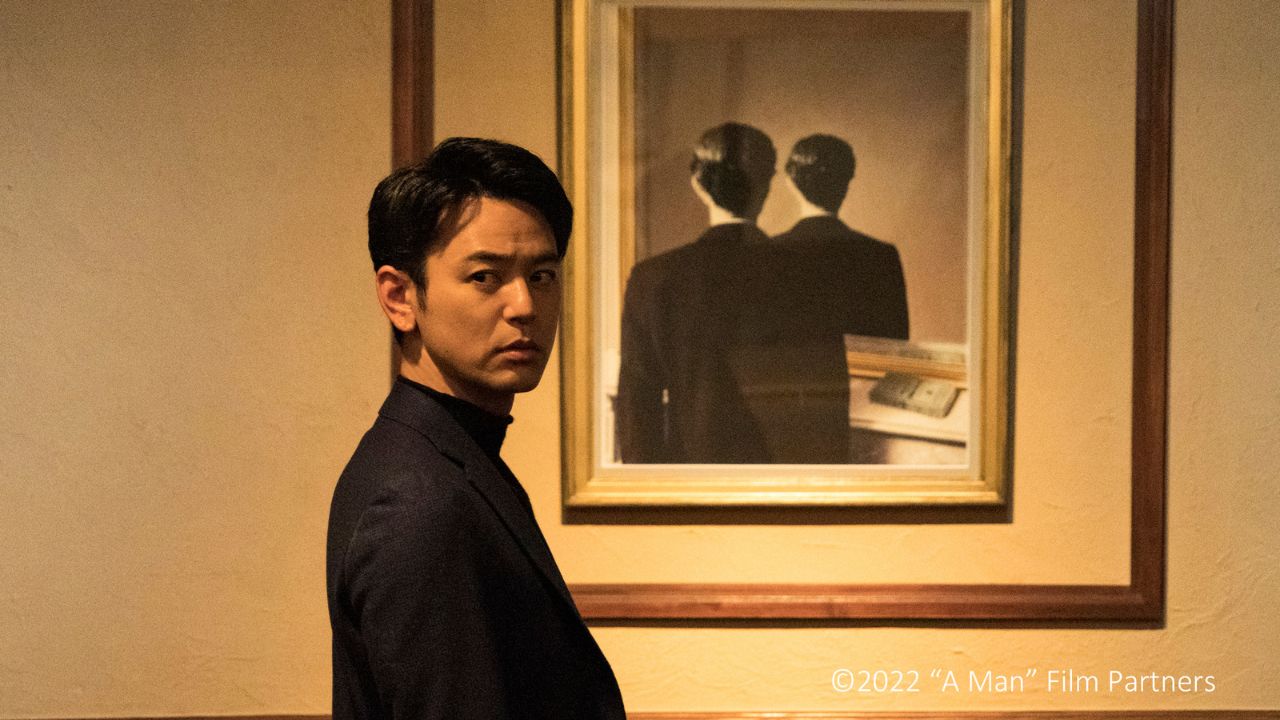First off, certain outlets are calling A Man (ある男/Aru Otoko) a “thriller,” and that is actually doing the film a disservice. I get it, you want people to go out and watch a movie and everyone is looking for something that’s exciting and heart-pumping. This is not that movie. This movie is as much of a thriller as 2009’s Departures. Go into this movie as you would Departures and you won’t be disappointed. Am I putting this up there with an Oscar-winning film? Why yes, yes I am.
Does this movie have a mystery revolving around stolen identity? Yes. Is there a slightly broody, good looking detective-type character going around getting to the bottom of said mystery? Yes. But is there suspense? Yes. But very little of the action variety. Does that make it a bad mystery movie? Absolutely not.
Not a Noir

Okay fine, the synopsis does indeed read like a thriller, and certain trailers portray it as much. Single mother, Rie, meets a man, Daisuke Taniguchi, after settling back in her hometown. They raise a happy family together only to have him die in an accident. But when his estranged older brother, Kiyoshi Taniguchi, finally comes to pay his respects, she discovers that her husband was not “Daisuke Taniguchi” at all and his identity, as well as their entire life together, is thrown in doubt. Enter Akira Kido, her previous divorce lawyer who happens to be zainichi, to help her investigate this mystery. It has all the makings for a real hard-boiled gumshoe of a noir. But the buck stops there.
This is a film that starts out in the countryside of the Miyazaki prefecture, amid an idyllic setting, a lazy stationary shop, and nosy aunties. And that accident? Just a very unfortunate logging accident, in quite a cozy forest. Not exactly the stuff of suspense thrillers. What unfolds instead, is a multilayered meditation and heartfelt journey through identity and prejudices within Japanese society. But more than that, it sheds light on the prejudices we see or refuse to see within and without ourselves.
Watch Closely… Because Everything Matters

For the uninitiated, the Zainichi Kankokujin – Japanese nationals of Korean descent, hold a tenuous place within Japanese society – that ever insular and inward looking of monocultures. Their struggles and discrimination, most recently portrayed in Apple TV Plus’s Pachinko, are still evident in Zaitokukai (Anti Zainichi Korean) protests happening til this day. All this despite the fact, that for them, Japan has been the only home they have ever known. All this lends gravitas to Satoshi Tsumabuki’s performance of zainichi lawyer, Akira Kido, as well as his character’s determination to get to the root of this mystery.
A Man is based on a 2018 novel of the same name by Keniichi Hirano, and where the book centered around Akira Kido’s efforts and struggles; film director Kei Ishigawa’s choice to include other character’s perspectives lends weight to how Daisuke Taniguchi’s deception affects the lives of those around him. It is a study of the implications of our actions on the people around us and those we leave behind, as well as the role of identity – how we see ourselves and how we are perceived – and the role it plays in how we navigate our way in life. Ishigawa handles his subject matter with a deft hand, effortlessly weaving the multitude of perspectives together with ease. Very little is superfluous, everything matters.
That isn’t to say the movie isn’t without its flaws. At a run time of 2 hours, there are times when the pacing can seem a bit slow. That said, the movie is never draggy. Just contemplative. As I said previously, it is a meditation. The plot does move along albeit at a leisurely pace.
Not to Be Reproduced

The way Ishigawa chose to end his movie is a bit… interesting. Had the movie ended six minutes, or even three minutes, earlier, I may not have had this reaction. But the ending Ishigawa did give us seems to be his effort to stay true to a central philosophical theme of the book, a certain level of meta-existentialism, which is something not really seen in the body of this movie.
Your mileage may vary. But here’s a nugget of information that may help you along your way. The painting seen at the very start of the movie is a rendition of surrealist artist René Magritte’s Not to Be Reproduced – a commissioned portrait of his patron, poet Edward James. The work depicts a man standing in front of a mirror, but whereas the book on the mantelpiece (a well-worn copy of Edgar Allan Poe’s The Narrative of Arthur Gordon Pym of Nantucket) is reflected correctly, the man can see only the back of his head. We think about reproduction as something that tells us the truth. Reproduction also suggests multiplicity. All of that plays into the themes and metaphors portrayed in this movie. Make of that what you will.









Follow Us